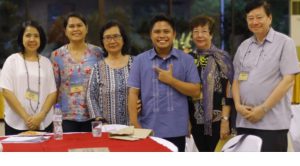… EDUCATION FOR PEACE …
An article by the Global Campaign for Peace Education
On June 27-28, 2016, the Dept. of Peace and Conflict Studies of the University for Peace and the Center for Peace Education of Miriam College organized a Forum on the theme “Three Decades of Peace Education in the Philippines.” The Forum, held at the Environmental Studies Institute of Miriam College, Quezon City Philippines, gathered more than 60 peace educators and advocates from all over the country representing various groups actively engaged in the peace movement in the Philippines for the past three decades. Participants came from state and private universities, colleges and schools, government, nongovernment and civil society organizations, interfaith dialogue circles and peace education/studies scholars from the University for Peace and Miriam College and UNESCO-ASP network.

Click on photo to enlarge
Sharing personal stories has long been an inspiring and powerful way of reminding us how we may be better able to re-vision and respond to what may lie ahead. It has been more than three decades that peace education in the Philippines has become a goal, a pedagogy, a program and a movement. Before the formal institutionalization of Peace Education in the Philippine education system, the movement for Peace Education in the country began in the early 1980s, with the efforts of several individuals and groups from civil society organizations, academic institutions, and international organizations engaged and mobilized to promote and mainstream education for peace. After the 1986 People Power Revolution, peace education took off through various efforts of individuals, universities, academic/professional groups and civil society organizations, among others.
The two-day Forum provided an opportunity for sharing stories of hope and challenges of formal and/or non-formal or community educators in promoting peace education over the past three decades. At the end of the Forum, participants were able to share renewed hope and inspiration of how to move forward as peace educators to fulfill a vision of a more just, compassionate, peaceful and sustainable planet.
Some of the most significant learnings from the forum included, in the words of participants, reflections such as: unique and inspiring stories of commitment towards peace advocacy, justice and integrity; storytelling is a powerful tool for peace education; diverse patterns of peace education and experiences that provide a lot of hope and wisdom; cascading theoretical knowledge about peace to practice; the sharing of best practices, framework & programs; the power of storytelling provides a concrete result for what has been done to really strengthen the implementation of peace education; there are many champions in peace education; the need to walk the talk; there are a hundred and one platforms for promoting peace education; peace education as a tool for social change/transformation; recognizing historical injustices from the earliest time; affirming peace education initiatives among Muslims and indigenous peoples; there are committed and passionate people sustaining peace education all over the country in different levels and areas – community, schools, government, and others; the feeling of affirmation that each one’s work and engagement finds connection in the stories of others.
(Continued in right column)
Where is peace education taking place?
(Continued from left column)
The stories presented in the Forum will form the core of a proposed book publication which will be helpful in enhancing the theory and practice of peace education in the Philippines as well as in other countries and regions worldwide.
This very successful gathering and story sharing of peace educators spanning some three decades in the Philippines was organized and coordinated by Dr. Toh Swee-Hin and Dr. Virginia Cawagas from the University for Peace in Costa Rica and Dr. Jasmin Nario-Galace from Miriam College Center for Peace Education in the Philippines.
Participants represented the following institutions.
FORMAL EDUCATION SECTOR
▪ Asia Pacific Network of International Education & Values Education (APNIEVE)
▪ Ateneo de Manila University Grade School
▪ Ateneo de Zamboanga University, Peace Institute
▪ Cotabato City State Polytechnic College
▪ DepED-Basic Education Sector BEST
▪ Far Eastern University, Angel C. Palanca Peace Program Foundation
▪ Holy Angel University, Angeles, Pampanga
▪ Mindanao State University, Maguindanao
▪ Miriam College, Center for Peace Education
▪ Miriam College, Grade School
▪ Philippine Military Academy
▪ Philippine Normal University
▪ St. Paul College, Pasig, Institutional Research
▪ University for Peace Costa Rica, Dept. of Peace & Conflict Studies
▪ University of the Philippines
▪ World Council for Curriculum and Instruction (WCCI)
▪ Xavier University Peace Center
NON-FORMAL EDUCATION SECTOR
▪ Conflict, Security and Development Team, The World Bank Philippine Office
▪ Gaston Z. Ortigas Peace Institute
▪ Generation Peace
▪ Institute for Autonomy and Governance
▪ Interfaith Center for a Culture of Nonviolence (ICCN)
▪ Mindanao Peoples Peace Movement
▪ Museo Pambata
▪ Office of the Presidential Adviser on the Peace Process (OPAPP)
▪ Pax Christi Pilipinas
▪ PAZ, Peace Advocates Zamboanga
▪ Silsilah Dialogue Movement
▪ Teach Peace Build Peace Movement
▪ The Peacemakers Circle
▪ ZFD Forum of Development